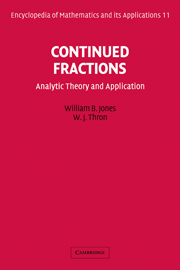Book contents
- Frontmatter
- Contents
- Editor's Statement
- Section Editor's Foreword
- Introduction by Peter Henrici
- Preface
- Symbols
- Continued Fractions
- Chapter 1 Introduction
- Chapter 2 Elementary Properties of Continued Fractions
- Chapter 3 Periodic Continued Fractions
- Chapter 4 Convergence of Continued Fractions
- Chapter 5 Methods for Representing Analytic Functions by Continued Fractions
- Chapter 6 Representations of Analytic Functions by Continued Fractions
- Chapter 7 Types of Corresponding Continued Fractions and Related Algorithms
- Chapter 8 Truncation-Error Analysis
- Chapter 9 Asymptotic Expansions and Moment Problems
- Chapter 10 Numerical Stability in Evaluating Continued Fractions
- Chapter 11 Application of Continued Fractions to Birth-Death Processes
- Chapter 12 Miscellaneous Results
- Appendix A Classification of Special Types of Continued Fractions
- Appendix B Additional Results on Minimal Solutions of Three-Term Recurrence Relations
- Bibliography
- Author Index
- Subject Index
Chapter 4 - Convergence of Continued Fractions
Published online by Cambridge University Press: 04 August 2010
- Frontmatter
- Contents
- Editor's Statement
- Section Editor's Foreword
- Introduction by Peter Henrici
- Preface
- Symbols
- Continued Fractions
- Chapter 1 Introduction
- Chapter 2 Elementary Properties of Continued Fractions
- Chapter 3 Periodic Continued Fractions
- Chapter 4 Convergence of Continued Fractions
- Chapter 5 Methods for Representing Analytic Functions by Continued Fractions
- Chapter 6 Representations of Analytic Functions by Continued Fractions
- Chapter 7 Types of Corresponding Continued Fractions and Related Algorithms
- Chapter 8 Truncation-Error Analysis
- Chapter 9 Asymptotic Expansions and Moment Problems
- Chapter 10 Numerical Stability in Evaluating Continued Fractions
- Chapter 11 Application of Continued Fractions to Birth-Death Processes
- Chapter 12 Miscellaneous Results
- Appendix A Classification of Special Types of Continued Fractions
- Appendix B Additional Results on Minimal Solutions of Three-Term Recurrence Relations
- Bibliography
- Author Index
- Subject Index
Summary
Introduction
There exists such a wealth of convergence criteria for continued fractions that a selection has been unavoidable. We present the results that have been the most useful for applications, as well as the theorems that appear to us as having the most promise. That the potential of this latter group has not been fully realized we believe is due to the fact that it is relatively unknown. Many of these results are of recent vintage.
Among the best known and most often used convergence criteria are those of Worpitzky [1865, Corollary 4.36(B)], Pringsheim [1899, Theorem 4.35, Corollary 4.36] and Van Vleck [1901a, Theorem 4.29]. Not quite so well known, but surely of great importance, are the parabola theorems, of which we give a simple version in Theorem 4.40, and stronger versions in Theorems 4.42 and 4.43. Of the relatively unknown results we would like to emphasize Theorem 4.33, which is an extremely general criterion for continued fractions K(1/bn), and Theorem 4.49, which is a powerful twin-convergence-region theorem for continued fractions K(an/1). Not enough attention has been paid in the past to results which insure convergence of the even or odd part of a continued fraction. Such results have been considered as only a first step in proving convergence of the whole continued fraction. We feel that these criteria should be considered in their own right and give examples in Theorem 4.31 and Theorem 4.50. More results of this kind can be found in [Jones and Thron, 1970].
- Type
- Chapter
- Information
- Continued FractionsAnalytic Theory and Applications, pp. 60 - 146Publisher: Cambridge University PressPrint publication year: 1984



